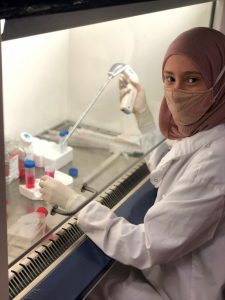Towards improved immunotherapy: Investigating the effects of Pyrazinib (P3) in promoting immunogenicity in Oesophageal cancer

Khadija Haouit
Oesophageal adenocarcinoma (OAC) is a cancer of the lower part of the food pipe. In the western world, increasing rates of OAC corresponds to the rising incidence of obesity. Radiatiotherapy and chemotherapy are the mainstay treatments for OAC, but response rates remain low at ~30%, and as such there is an urgent need to develop treatments to improve response rates and survival in these patients.
As cancer cells die they release proteins called antigens, which are captured by specialised immune cells called dendritic cells. Dendritic cells present the captured material to effector immune cells called T cells. Activated T cells travel to the tumour site to kill cancer cells. Unfortunately cancer cells have developed tactics to camouflage from T cells, by expressing proteins on their cell surface which prevents the T cell from performing its job.
Our research aims to assess the use of a novel drug called Pyrazinib (P3), which increases tumours sensitivity to radiation. As a result, this promotes the sensing of damaged OAC cells by the immune system following radiotherapy and results in enhanced cancer cell death. We will also determine whether P3 can be used in combination with immune checkpoint inhibitors, a type of immunotherapy that enhances T function.
This study aims to identify new combination treatments to enhance response to radiotherapy and immunotherapy treatment in OAC and ultimately improve patient outcomes.
Back









 Contact
Contact